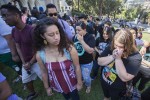The special election included five candidates, two referendums and one constitutional amendment. But the only number anyone is talking about is 13.6.
The turnout for this election was never expected to be particularly high, but the numbers were abysmally low at a rate of 13.6 percent. Other than just looking bad for our campus, the undergraduate population’s apathy had real consequences.
Had it passed, the Bruin Diversity Referendum would’ve raised student fees by almost $30 per year to support programs that “strengthen the student body’s acadmic” and “cultural … diversity.” But the poor turnout exposed how student apathy about student elections actually damages the democratic process: The referendum earned a majority vote, but the voter turnout dipped well below the 20 percent threshold, blocking the referendum’s passage.
The $7,000 campaign put on by organizers was the only force attempting to sway voters one way or the other; there was no vocal opposition to the measure. The organizers’ only real obstacle was voter turnout, and they clearly didn’t do enough to traverse it. But had they received some help from the Undergraduate Students Association Council Election Board, they may not have faced such a problem.
In regards to the referendum’s backers, placing the measure on the special election ballot rather than waiting until May all but ensured its failure. It’s likely that even if the referendum had reached the 20 percent threshold, it would have reached it by a slim margin. Twenty percent of students is too few to make a decision about such a large fee increase. The organizers should have taken that fact into account before bringing it forward.
Regardless of the backers’ mistakes, however, the Election Board bears the brunt of responsibility for the low voter turnout that led to the referendum’s failure.
The lack of effort by the Election Board to promote the election to students was also a major part of this. It’s the Election Board’s job to make sure the elections are fair and well policed. But when the turnout is this low, no amount of policing or sanctions could make the election truly democratic. Getting students to vote should be just as important, if not more important, to the board as slapping ill-behaved candidates on the wrists.
It’s understandable that the Election Board had a limited amount of time to prepare for this election, but they should’ve foreseen a turnout problem and acted to correct it ahead of time. This is no small task; USAC elections rarely inspire large numbers of students. But they needed a strategy and didn’t come up with one in time.
USAC campaigns are often so visible it’s nauseating; this one wasn’t much different. You’d be one of a select few if you managed to walk across campus without seeing flyers or posters. But since the election occurred so early in the year, freshmen and new transfer students, a good percentage of the undergraduate population, probably had no idea what was going on. Having people’s faces plastered on posters on Bruin Walk doesn’t explain much about what’s going on, especially if you’re new to the campus community.
The process of voting itself takes a few seconds and determines who receives and manages a total of about 4 million dollars of student fees per year. This fact alone should be enough to raise voter turnout rates.
Something as simple as having laptops on Bruin Walk to vote on the spot or distributing USAC fact sheets could’ve at least made this information easily accessible. This could’ve been done by the Election Board, referendum backers or both. Students should have an opportunity to know basic information about the body that governs them. Too often the elections are decided by a small portion of the undergraduate student body, even though these voters’ decisions impact every single undergraduate on campus.
Luckily for the sitting board members, this embarrassment can be redeemed. If any positives could be drawn from the special election, the experience the Election Board gained in administering an election is certainly near the top of the list.
The board can take its mistakes and correct them in May. If they set a solid plan in place to increase voter turnout, which will inevitably improve anyway, because of the hype surrounding May elections, they could even see an increase from last year’s numbers. An increasing trend in voter turnout could salvage the reputation of this year’s board.
There was nothing special about the special election. Mistakes were made by referendum backers and the Election Board; both contributed to the 13.6 percent turnout. For now, the election board needs to reevaluate its strategies and work out some major kinks to avoid another failed election.

Dear Daily Bruin,
That’s life. Ut vitae. Così va la vita. Tá a leithéid saol. So ist das Leben. C’est la vie. Así es la vida. このような、生命である. 生活就是這樣. Έτσι είναι η ζωή. 그게 인생이야. אַז ס לעבן. Iyon ang buhay. ככה זה בחיים. यही जीवन है. Hayat bu. Ko e ora. Դա կյանք. Assim é a vida.
Best,
Matthew P. FitzGerald
J.D. Candidate UCLA Law Class of 2017
B.A. International Studies, Conc: Global Health & Italian Studies, University of Washington-Seattle June 2012
Aright I erased it. Used Google Translate, sorry it was wrong :)!
Maybe more people would have voted if there was something they cared about to be voted on. I don’t see myself spending any time on programs that try to “strengthen the student body’s academic and cultural diversity” by raising the cost of education. How about strengthening the student body’s ability to get an education without having to work 30 hrs per week to try to stay out of debt?